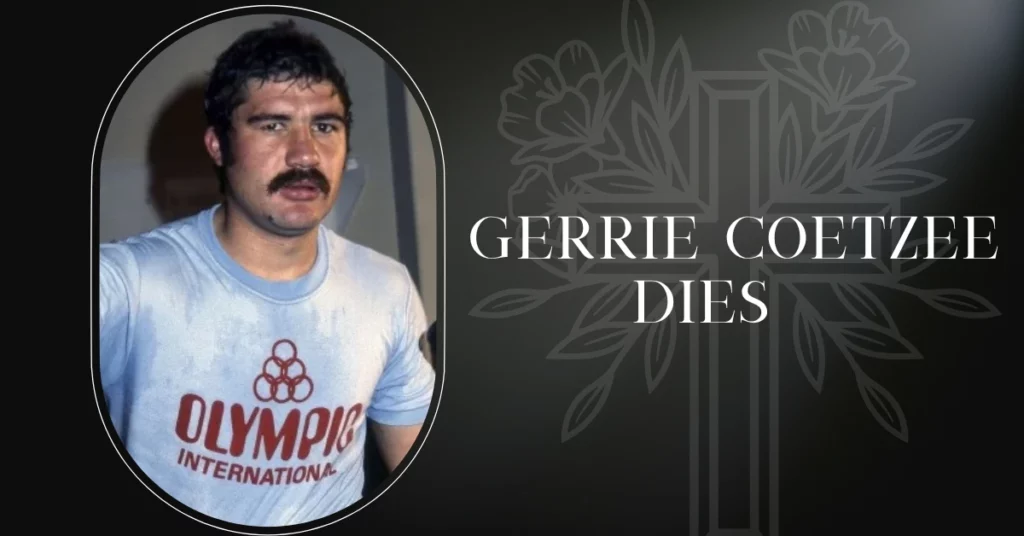Former WBA Heavyweight Champion Gerrie Coetzee Dies At 67!
Gerrie Coetzee, a former South African boxer and WBA heavyweight champion, has passed away. During the height of apartheid in the 1970s and 1980s, Coetzee defied some of his country’s racial laws and gained the respect of Nelson Mandela and both Black and white fans. He was 67.
Just over a week after receiving a lung cancer diagnosis, Gerrie Coetzee passed away on Thursday in Cape Town, according to his old manager Thinus Strydom.
The white Gerrie Coetzee was the first African boxer to win a world heavyweight title. In Richfield, Ohio, in 1983, he defeated American opponent Michael Dokes in the 10th round to capture the WBA belt. This significant upset was lauded across South Africa despite the country being divided at the time due to apartheid laws enforcing racial segregation.
With his victory over Dokes, Gerrie Coetzee became the first white boxer to win the world heavyweight championship in more than 20 years. However, he made it evident that he detested the moniker “the great white hope” following the fight.
Coetzee stated, “I am fighting for everyone, Black and White.” Accepting me as their fighter by Black, Brown, and White people pleased me.
They did in South Africa, and for his boxing prowess and contribution to “nation-building through sport,” Coetzee was given The Order of Ikhamanga in Bronze by South Africa’s democratically elected post-apartheid government in 2003.
Former South African world heavyweight boxing champ Gerrie Coetzee dies https://t.co/JJtFV3RA49
— Yusuf Abramjee (@Abramjee) January 12, 2023
The government said that over Coetzee’s career, millions of Black South Africans supported him, “confounding the false logic of apartheid.”
According to Gerrie Coetzee, one of Mandela’s most treasured memories occurred when an enormous boxing fan requested to see him in the early 1990s. In 1994, Mandela, the first democratically elected president of South Africa, had just been freed from jail after serving 27 years for his opposition to apartheid.
It was overwhelming because Mr. Mandela set an example for the nation as it got ready for democracy, according to Coetzee. He gave me a medal in a dreamlike moment. I was shocked when I learned that he had listened to radio commentary of a handful of my fights while incarcerated.
Gerrie Coetzee wanted to present Mandela with a gift during a later encounter, so he gave him a medal that the apartheid regime had previously given him. Coetzee claimed that Mandela politely accepted the donation after learning about the award’s origin.
“Mr. Mandela didn’t appear to care… He viewed it as a gift from me, and I appreciated that, said Coetzee.
After losing to John Tate in 1979 in a contest for the WBA title that had become vacant following Muhammad Ali‘s retirement, Gerrie Coetzee eventually won the heavyweight title on his third attempt. When Coetzee took on Mike Weaver in 1980, he lost a second chance at the WBA title after being stopped in the 13th round.
Read also:
- How Is Tatyana Ali Related To Muhammad Ali?
- Pulitzer-Winning Serbian-Born Poet Charles Simic Dies At 84
In his first fight outside South Africa, Gerrie Coetzee defeated previous undisputed heavyweight champion Leon Spinks in the first round in Monaco in 1979, introducing himself to the world. But it took him an additional four years to succeed.
Dokes’ defeat against Gerrie Coetzee to win the WBA title wasn’t without cost. His manager said that after breaking his right hand earlier in the fight, he could still use a sequence of punches to knock out Dokes. He soon needs surgery.
Throughout his career, Gerrie Coetzee’s mighty right hand required several operations due to ongoing injuries, earning him the moniker “Sore Little Hands” from South African heavyweight competitor Kallie Knoetze. Coetzee was also referred to as “The Bionic Hand” at times.
However, his most well-known moniker was the “Boksburg Bomber” in honor of his working-class hometown close to Johannesburg. Coetzee’s debut fight as a professional took place in 1974, and he frequently competed in South African battles against Black opponents in front of racially diverse fans. He chose an Indian-born South African guy to be his media spokesperson, which greatly infuriated the apartheid regime.
Despite stringent apartheid rules at the time that forbade Blacks from residing in the same areas as whites, Coetzee volunteered to train a young Black fighter and extended an invitation for him to stay with him in his home in the 1980s. Coetzee received a court summons due to the police searching his residence. Despite the summons, according to Gerrie Coetzee, he formally adopted the youngster whose parents had passed away.
In 40 fights, Gerrie Coetzee had 33 victories (21 by knockout), six defeats, and one draw.
